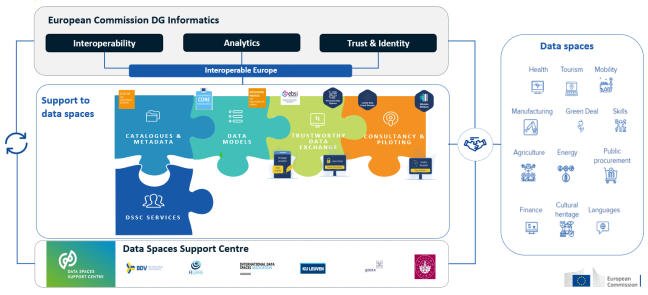The European Commission adopted a European strategy for data in 2020 which aims at creating a single market for data that will ensure Europe’s global competitiveness and data sovereignty. Common European data spaces will ensure that more data becomes available for use in the economy, society and research, while keeping the companies and individuals who generate the data in control. The Commission supports the development of common European data spaces in strategic economic sectors and domains of public interest. Learn more about how DG DIGIT can support data spaces.
What are Data Spaces? | How can DG DIGIT support data spaces? | What support can DIGIT B provide? | When and how can data spaces ask for support?
What are Data Spaces?
According to the Commission Staff Working Document on Common European Data Spaces, “a common European data space brings together relevant data infrastructures and governance frameworks in order to facilitate data pooling and sharing.” This document also defines key features of a common European data space, namely:
- A secure and privacy-preserving infrastructure to pool, access, share, process and use data.
- A clear and practical structure for access to and use of data in a fair, transparent, proportionate and/non-discriminatory manner and clear and trustworthy data governance mechanisms.
- European rules and values, in particular personal data protection, consumer protection legislation and competition law, are fully respected
- Data holders will have the possibility, in the data space, to grant access to or to share certain personal or non-personal data under their control.
- Data that is made available can be reused against compensation, including remuneration, or for free.
- Participation of an open number of organisations/ individuals.
Common European data spaces should follow specific design principles which include a common technical infrastructure and building blocks, as well as interconnection and interoperability.
All in all, data spaces are expected to significantly contribute to accelerating digital transformation within and across domains and supporting economic recovery plans. In the future, the ambition is to have a European data space which interconnects different data spaces and ensures that data are extensively shared and used while complying with EU values and regulations.
How can DG DIGIT support data spaces?
Over the years, DG DIGIT has been driving the creation of solutions which have been tried, tested and deployed across many European projects and by several EU Member States. DG DIGIT is therefore particularly well-positioned to provide data spaces with a portfolio of solutions that enable interoperability (within and across data spaces), in a cost-effective way, based on open standards and in respect of EU values and regulations. More concretely, the units of Directorate B of DG DIGIT play an important role in the development of the common European data spaces by making available:
- Data models to create, publish, validate and implement data assets;
- Catalogues & metadata to provide structured data description and inventory;
- Trustworthy data exchange to ensure secure, cross-domain and cross-border data exchanges; and
- Consultancy & piloting to share knowledge, provide guidance and enable testing for faster go-to-market solutions.
DG DIGIT is seeking synergies with the Data Space Support Centre (funded by the European Commission) and other relevant players in the market to accelerate the creation of common European Data Spaces by promoting sharing and reuse of existing solutions, specifications and tooling.
A more detailed overview of the support that DIGIT can provide to data spaces can be found here.

What support can DIGIT B provide?
The DIGIT B service offering includes a reference architecture, building blocks, semantics, interoperability specifications and data models, accompanied by related advisory services.
Reference architecture
Data spaces will need to identify an architecture and technical data governance framework to support domain and cross-domain data use. DIGIT can provide a blueprint to help build your IT infrastructure so that it makes it easier to exchange data with other organisations in a data space. eGovERA provides a Business Agnostic reference architecture (v.2.0.0) within and across the business agnostic policy domain.
Building blocks
Common building blocks will be essential to enable identification and authentication of parties, manage, consent, access rights and access control, or exchange online data and documents in a reliable and secure manner.
Semantic interoperability
Data spaces need to identify common standards, including semantic standards and interoperability protocols, metadata and data models for exchanging data within and across sectors. The SEMIC action offers open and free-to-use data models, specifications and innovative semantic tools to foster interoperability.
Application Programming Interfaces (APIs)
Public and private sector organisations need to make available their data in machine-readable format. Learn from global best practices, recommendations and guidelines of application programming interfaces collected by the Joint Research Centre (JRC). These APIs enable data exchange from and for the public sector.
European Blockchain Services Infrastructure
Data spaces may want to leverage the power of blockchain technologies to ensure trusted data exchange, use verifiable credentials, or for track & trace purposes.
Big Data Test Infrastructure
Data spaces may want to explore and experiment with Big Data for improved performance and decision-making. DIGIT provides a safe testing environment to run big data experiments for data space customers. We provide services to help public administrations experiment with data analytics tools, collecting insights and creating knowledge from several datasets.
Data analytics advisory services
DIGIT provides data expertise on data architecture, data structuring (linked data), knowledge graph, data quality and visualisation using AI-driven solutions like machine learning, natural language processing, or speech to text.
When can common European data spaces ask for support?
Now – irrespectively of the development phase you are in. Do you need help to:
- Define your strategic and implementation roadmap?
- Make your data space compliant with data standards?
- Guide you in your technological implementation of personal data?
- Implement semantic assets and knowledge graphs?
- Learn about good practices for APIs?
- Structure your large-scale and fast-evolving datasets?
Contact us for an initial discussion and assessment so that we can agree on the type of support you need.

Related support and events in 2023
| What? | When? |

